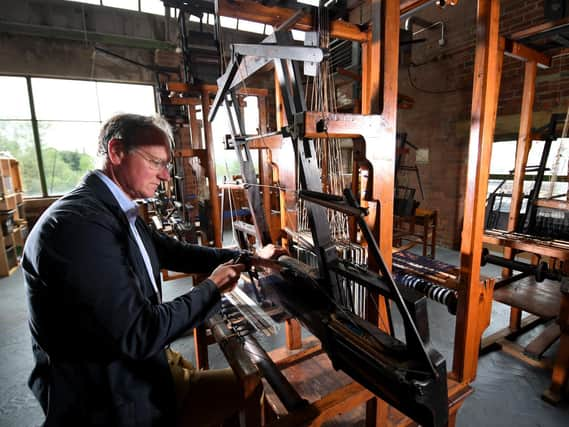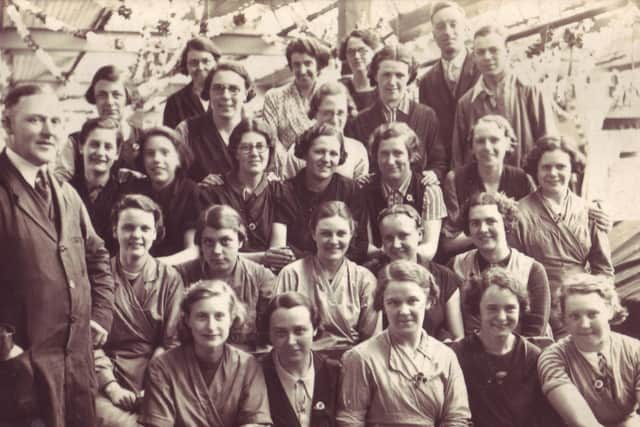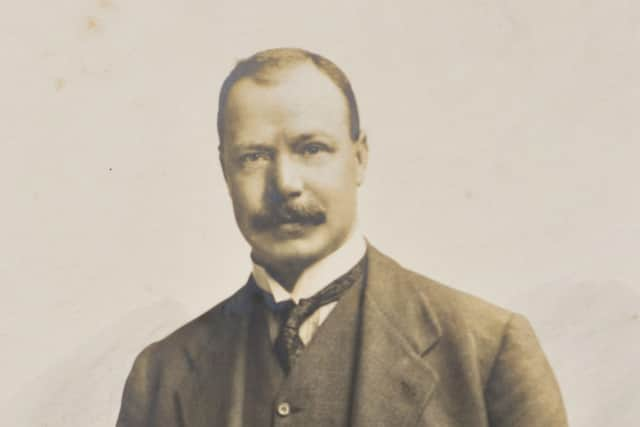The remarkable family story behind this landmark Yorkshire mill that is still weaving a yarn


William Gaunt is a businessman and entrepreneur – as well as an authority on weaving and weavers. “It seemed to all coalesce in Yorkshire and, back then, in the smaller towns, because in places like the City of York there were strong Guild associations,” he says.
“Until the Industrial Revolution, weaving was very much a solitary or a family affair, done from your own dwelling and often in a first floor room, where bigger windows would give more light. I suppose that you could accurately call this the very first ‘working from home’. Years later, Daniel Defoe was astounded by the industry he found here on one of his travels.”
Advertisement
Hide AdAdvertisement
Hide AdOf course, the woollen and worsted trade has had its many ups, and an awful lot of downs, and there are only a handful of mills working today, but there is one place where our heritage is being cheerfully celebrated, while the future is being addressed with new and innovative plans – welcome to Sunny Bank Mills in Farsley, near Leeds.


William Gaunt and his cousin John are adapting a colourful history into a confident and sustainable vision for the years ahead. For, while they sold the family textile business in 2008, they didn’t part with the huge mill. And, unlike many other noble buildings that have either been demolished, or which still stand, but are slowly decaying in their post-industrial landscape, Sunny Bank Mills is now part of a huge multi-million revitalisation project. It has opened its doors to many diverse businesses (over 70 in all) home to a combined workforce of around 350 people. And there are plans for further expansion in “Project Boilerhouse” – ten acres of land in all (the old mill buildings sit on two acres alone).
The Gaunts always seemed to have been progressive in their attitudes during their longstanding connection to the weaving industry – one ancestor was part of a group that formed a co-operative back in 1820, so that collective overheads could be shared. “Each paid rent to work in a larger space,” says William, “and that made absolute sense. The men were the weavers, the womenfolk did the spinning.”
The Gaunts also showed shrewd acumen in another way – one of them, Edwin, served as a local councillor (a Liberal) and was Mayor of Leeds for two consecutive years.
Advertisement
Hide AdAdvertisement
Hide AdThe records of William Gaunt and Sons are a valuable archive for the area, documenting which families worked for them and their occupations. They proved so popular with people researching their lineage that they are now meticulously curated and open to the public for one day a week.


“You can see great-great-grandfathers on the pages,” says William, “with their fathers before them, and their sons and grand-daughters and all manner of relatives, everyone carrying on their traditional jobs. There are so many people in Farsley and the district around it who have strong links to the mill, and each of them have stories to tell.”
None of those yarns, however, is likely to equal William’s great-grandfather, “Billy” Gaunt. “He was”, says William in a masterpiece of understatement, “quite a character, and a very savvy cookie.” Billy didn’t just run one of the major mills of Britain, he made money internationally, too. At one point, he actually bought up the year’s supply of wool from one single country – and Uruguay was very grateful indeed.
He also owned five large theatres. “Not in Yorkshire,” says William, “but in the West End, in the heart of London. Among them The Winter Gardens, the Gaiety and The Adelphi. So it was almost inevitable that a lot of the leading stars of the era were house guests at his Yorkshire home, very high-profile celebrities indeed.”
Advertisement
Hide AdAdvertisement
Hide AdBilly grabbed every opportunity that came his way and after the First World War, he bought up all the available British Army cloth stock. One of his two sons also seems to have been a ‘chip off the old block’. It may have been at one of his dad’s theatres that he met the vivacious Adele Astaire, then part of a dancing double act with her brother, Fred. He seems to have offered Adele (who was keen to retire from the stage) his hand in marriage.
Everything was going well – until 1929 when along came the Wall Street Crash that sent many firms into freefall. Billy’s businesses started to buckle as Britain was hit by the depression, and then the Bank of England’s decision to leave the gold standard in 1931. Adele Astaire changed her mind, and married the second son of the Duke of Devonshire instead.
Billy Gaunt sold just about everything he had to pay off his debts and obligations. “He even sold his remarkable story to the News of the World for a sizable fee in 1932. Anything to pay what he owed,” says William. “But he never ever gave up on Sunny Bank Mills.”
When he died, in 1942, he was still very much admired, with J B Priestley among his friends. “But Billy realised that he had made one big mistake, for he said that he had just been ‘too involved with business, rather than family life’. My grandfather took over, re-built the business and innovated across the board. He was a ‘big presence’ in any room and I admired him a lot.”
Advertisement
Hide AdAdvertisement
Hide AdSunny Bank Mills could not have done more to ensure survival – they were constantly seeking new markets, and even sold fine cloth to the Middle East and elsewhere. But in the end, bowing to market pressures, William and John had to sell the manufacturing side of the firm.
You might have thought that was the end of the story. Not a bit of it. Both cousins had studied weaving and textile design at Leeds College, and it was William who started a search for some old-style looms and who finally found ten of them, in a poor state of repair, in a Dewsbury mill. He had them brought over to Farsley where they were painstakingly restored – and the tatty ten were turned into a fully-working eight. They are each well over a century old and these are the machines that people can come and use today – either to learn weaving skills and traditions, or to improve their existing techniques.
“It’s always been a case of adapting to needs and finding the right markets,” says William. “The community around us really seem to approve and they’ve really bought into the idea of a ‘new’ mill, which is a nod to the past, but also with an eye to the future.”
The hope now is that with a younger generation of Gaunts coming through one of them might pick up the baton in a few years time. “We grown-ups are hoping that one, two, or even all of them, will want to continue working here. Oh, and since you ask, Sunny Bank is south-facing and we do catch a lot of sun when it shines. We’re hoping that the future is good and sunny as well.”
Advertisement
Hide AdAdvertisement
Hide AdFor information about the weaving courses (social distancing and hygiene measures observed), and the many other business opportunities at Sunny Bank, visit: www.sunnybankmills.co.uk
Support The Yorkshire Post and become a subscriber today.
Your subscription will help us to continue to bring quality news to the people of Yorkshire. In return, you'll see fewer ads on site, get free access to our app and receive exclusive members-only offers.
So, please - if you can - pay for our work. Just £5 per month is the starting point. If you think that which we are trying to achieve is worth more, you can pay us what you think we are worth. By doing so, you will be investing in something that is becoming increasingly rare. Independent journalism that cares less about right and left and more about right and wrong. Journalism you can trust.
Thank you
James Mitchinson
Comment Guidelines
National World encourages reader discussion on our stories. User feedback, insights and back-and-forth exchanges add a rich layer of context to reporting. Please review our Community Guidelines before commenting.